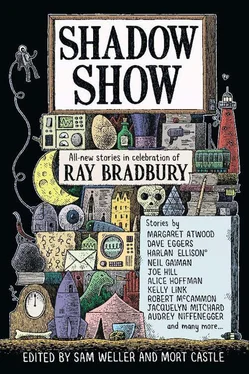“This is Shirley, isn’t it?” he asks. His voice cracks. He’s trying not to cry.
“It is ,” she says suspiciously. “And who are you ?”
There is no way he can explain to her who he is. He can only try to keep her talking.
“We met a few years ago,” Doug says. “I worked with your husband, Tim.” Silence. “My name’s Frank Ivers. You wouldn’t remember me.” He forces out a laugh. He hears the child in the background again. The child is him. He’s listening to his younger self. “I didn’t know Tim well,” Doug says, “but I always liked him. I’m just calling…” He pauses. He’s shivering but trying not to. “I’m just calling to see how you’re holding up.”
He hears his mother lighting a cigarette. This means she’s settling in for a long conversation.
“It hasn’t been an easy three years,” she says. “The day Bob came home with the news…” She blows smoke into the mouthpiece. She’s sitting down now, Doug imagines. “It was the worst day of my life.”
“I’m so sorry,” he says. “I just want you to know that I’m a friend.”
His mother makes a noise of assent, but she’s lost in her own world. How many times had he seen this, his mother sitting on the couch and staring straight ahead as he tried to get her attention, showing her the cover of his new Famous Monsters of Filmland ?
“Something’s not right,” she says finally. “I can’t put my finger on it, but…”
“Yes?”
Doug hears something rumbling in the background. A pickup truck?
“I’ve got to go,” his mother says.
“Who is it, Shirley? Is it Bob?”
The phone goes dead.
Doug is pacing the room, two fingers holding the heavy black phone, the phone’s base resting against his thigh. He sets down the phone, hangs up the receiver. After his father’s death, Bob began coming over more frequently, sometimes spending the night on the couch. Doug’s earliest memories are of his uncle snoring on their sofa as his mother tiptoed through the room and scolded Doug for playing too loudly with his Hot Wheels. “You don’t want to wake that man” was how she put it.
Doug was fifteen when his mother was murdered. A homeless man, who had been dumpster diving, discovered Shirley’s body in a large trash bin behind an apartment complex. She was wrapped in a blue tarp. People who lived in the apartment building had thrown leaking bags of garbage on top of her, unaware that a body was there. An autopsy revealed that she had died from severe blunt head trauma. Police had detained the homeless man as a possible suspect, but there was nothing to connect him to Doug’s mother, and no weapons of any kind had been found on him. No weapon of any kind had ever been found. Bob had been questioned, too, but he’d provided an alibi—a friend claimed they’d spent the evening together watching the Cubs game on TV, the same friend who had been with Bob during Doug’s father’s hunting accident. Doug had been away at a high school speech tournament, spending the weekend in a dorm room downstate. The story of his mother’s death stayed in the news for several weeks, lingering longer than most, but eventually, like everything else in life, it faded.
Doug dials the number again. He isn’t drunk anymore. In fact, he feels more lucid than he’s ever felt. For the first time, he believes he can undo the terrible things that happened, that he can turn time back, that he can control the outcome. On the eighth ring, a boy answers.
“Hello?” the boy whispers.
“Hello?” Doug says. “Hello? Who is this? Is this Dougie?” Doug knows without a doubt that he is speaking to his younger self. He doesn’t even realize he’s crying until his knuckles, wrapped around the receiver and pressed against his face, pool up the wetness.
“Who are you?” the boy asks. “Is this Mr. Belvedere?”
Doug takes a deep breath. The name is familiar. But why? “Who’s Mr. Belvedere? Tell me about him.”
“He’s in a better place now,” Dougie says.
“He’s dead?” Doug asks. “Did someone kill him?”
“He’s in a better place now,” Dougie repeats.
“Listen,” Doug says. “I don’t have much time, and you won’t hear from me again for another couple of years, so I want you to do something for me, okay? I want you to remember who I am. I want you to pay attention. Because something terrible is going to happen, and only you can stop it.”
Dougie starts crying into the phone, and Doug remembers now how easily he used to fall apart, Uncle Bob always mocking him, matching little Dougie’s snivels with his own fake snivels, mashing his ugly, scrunched-up face against Dougie’s, his uncle’s sour breath like poison. He could taste that man’s breath for hours afterward.
“Don’t cry, Dougie,” Doug says. “Don’t cry. I’m your friend. You have to believe me. I’m your friend. Okay? I’m your…” He senses something has happened. “Hello? Dougie? Hello?” The call has been disconnected.
The phone calls are jumping in time, but by how much?
Doug quickly calls back, but the old phone is slow, and each number he dials on the rotary requires patience. It’s one of the reasons he has continued using this old phone, to distinguish himself from his coworkers who are always distracted by their cell phones, texting even as he’s trying to talk to them: “Go on,” they’ll say. “I’m listening.” Doug thought the rotary phone would keep him grounded, but now he desires speed; he desires whatever technology will allow him to stay in contact with his old life.
“Hello?” It’s the boy again. Dougie. Himself. His voice—the boy’s—is deeper now.
“Dougie,” Doug says. “How old are you?”
“Who is this?”
“Quick. How old are you?”
“Nine,” Dougie says.
“Nine,” Doug repeats. “Do you remember me? We talked probably three years ago? You had mentioned someone named Mr. Belvedere?”
“I don’t know what you’re talking about,” Dougie says.
In the background, a man calls out, “Who the hell are you talking to? If they’re selling something, just hang up!”
“Is that Uncle Bob?” Doug asks.
“Yes?” Dougie says. He’s suspicious, but he’s curious, too. Doug knows this because he knows how he would feel.
“Something terrible is going to happen to Mom,” Doug says. He swallows. Slow down , he tells himself. “To your mother ,” Doug says. “I don’t know who’s responsible, but I think it’s your Uncle Bob. It’ll happen when you’re fifteen.”
His voice shaking, Dougie whispers, “I’m calling the police.”
“It’s too soon,” Doug says. “He hasn’t done anything yet.”
“I’m calling them on you ,” Dougie says.
“No, no. I’m your friend.”
“No, you’re not,” Dougie says, and hangs up.
Doug dials the number again as fast as he can, as fast as the phone will allow him. It rings ten times. Eleven. Twelve. Thirteen. Has he wasted a phone call? What if time jumps six years the next time he calls? Pick up… pick up, he thinks. And then, miraculously, someone picks up. He can tell by the way the phone rattles, the way the receiver is almost dropped, that whoever picked up must have run to the phone.
“Yes? Hello?”
It’s his mother. It’s Shirley.
“Shirley?” Doug says.
“Yes?” She’s out of breath.
Doug realizes that this may be the last time he’ll ever talk to his mother. He also realizes that the phone he’s using is the same phone his mother is using: the heavy black rotary. They are holding the same receiver, but they are separated by time and space.
He decides to risk it. He’ll never forgive himself if he lets this moment go. “Mom,” he says.
Читать дальше



![Lord Weller - Ритера или опасная любовь [СИ]](/books/421202/lord-weller-ritera-ili-opasnaya-lyubov-si-thumb.webp)








